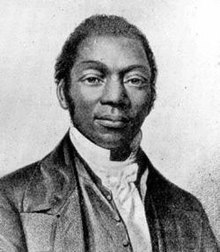James W. C. Pennington | |
|---|---|
 | |
| Born | c. 1807 |
| Died | October 22, 1870 (aged 62–63) |
| Alma mater | Yale University |
| Movement | Abolitionism in the United States |
James William Charles Pennington (c. 1807 – October 22, 1870) was an American historian, abolitionist, orator, minister, writer, and social organizer. Pennington is the first known Black student to attend Yale University.[1] He was ordained as a minister in the Congregational Church, later also serving in Presbyterian churches for congregations in Hartford, Connecticut, and New York. After the Civil War, he served congregations in Natchez, Mississippi, Portland, Maine, and Jacksonville, Florida.
In the Antebellum period, Pennington was an abolitionist, and among the American delegates to the Second World Conference on Slavery in London.[when?] In 1850, he happened to be in Scotland when the Fugitive Slave Act was passed by the US Congress. As it increased the risk for fugitive slaves in the North, Pennington stayed in the British Isles while friends worked to buy his freedom from his former master and then from his estate. Pennington raised funds for the abolition movement on the public lecture circuit in England.
Pennington wrote and published what is considered the first history of blacks in the United States, The Origin and History of the Colored People (1841).[2] His memoir, The Fugitive Blacksmith, was first published in 1849 in London.
On April 24, 2023, Yale awarded Pennington a posthumous M.A. Privatim degree [3]
- ^ "Announcing the Pennington Fellowship". Yale Office of the President. 12 December 2022. Retrieved 25 April 2023.
- ^ Cite error: The named reference
UNCSummarywas invoked but never defined (see the help page). - ^ "Honoring the Rev. James W. C. Pennington and the Rev. Alexander Crummell". Yale Office of the President. 24 April 2023. Retrieved 25 April 2023.